Amarok/Manual/Various/AmarokOnOtherPlatforms/NonKDE Desktops: Difference between revisions
Appearance
No edit summary |
m Updated for 2.8 |
||
| (42 intermediate revisions by 8 users not shown) | |||
| Line 1: | Line 1: | ||
<languages/> | |||
<span id="Amarok on Non-KDE Desktops"> | |||
== | <translate> | ||
==== Amarok on Non-KDE Desktops ==== <!--T:1--> | |||
<!--T:2--> | |||
Although '''Amarok''' is one the most well-known KDE applications, it can run on other desktop environments too. | |||
<!--T:3--> | |||
This section shows how '''Amarok''' can be used on non-KDE Linux desktops. These are examples; there may be more. | |||
== | ===== GNOME ===== <!--T:4--> | ||
[[File:Amarok e17. | <!--T:5--> | ||
[[File:Amarok-gnome.png|400px|center]] | |||
<!--T:6--> | |||
To configure the proxy for '''Amarok''' on GNOME, modify and add this to <tt>~/.kde/share/config/kioslaverc</tt> | |||
<!--T:7--> | |||
{{Input|1=<nowiki> | |||
[Proxy Settings][$i] | |||
ProxyType=1 | |||
httpProxy=http://username:password@proxyserver:port/ | |||
httpsProxy=http://username:password@proxyserver:port/ | |||
ftpProxy=http://username:password@proxyserver:port/ | |||
</nowiki> | |||
}} | |||
===== Enlightenment ===== <!--T:8--> | |||
<!--T:9--> | |||
[[File:Amarok-e17.png|400px|center]] | |||
<!--T:10--> | |||
The '''Amarok''' systray icon does not work by default with E17. So, one should disable the <menuchoice>Show tray icon</menuchoice> from <menuchoice>General Options</menuchoice> in '''Amarok's''' preferences. | |||
===== XFCE ===== <!--T:11--> | |||
<!--T:12--> | |||
[[File:Amarok-xfce.png|400px|center]] | |||
<!--T:13--> | |||
To launch '''Amarok''' faster, enable <menuchoice>Launch KDE services on startup</menuchoice> by going into <menuchoice>Settings -> Sessions and Startup -> Advanced</menuchoice> and checking the option. | |||
===== Fluxbox ===== <!--T:14--> | |||
<!--T:15--> | |||
[[File:Amarok-fluxbox.png|400px|center]] | |||
<!--T:16--> | |||
If '''Amarok''' is taking to long to load, add {{Input|exec kdeinit}} to <tt>~/.fluxbox/startup</tt>. | |||
===== LXDE ===== <!--T:17--> | |||
<!--T:18--> | |||
[[File:Amarok-lxde.png|400px|center]] | |||
<!--T:19--> | |||
In case '''Amarok''' starts slowly in LXDE, you can add <menuchoice>kdeinit</menuchoice> to the startup applications using the <menuchoice>lxsession-edit</menuchoice> command. | |||
<!--T:20--> | |||
{{Prevnext2 | |||
| prevpage=Special:myLanguage/Amarok/Manual/Various/AmarokOnOtherPlatforms | |||
| nextpage=Special:myLanguage/Amarok/Manual/Various/AmarokOnOtherPlatforms/Windows | |||
| prevtext=Amarok on Other Desktops and Operating Systems| nexttext=Amarok on Windows | |||
| index=Special:myLanguage/Amarok/Manual | indextext=Back to Menu | |||
}} | |||
<!--T:21--> | |||
[[Category:Amarok2.8]] | |||
[[Category:Multimedia]] | |||
[[Category:Tutorials]] | |||
</translate> | |||
Latest revision as of 02:34, 1 July 2013
Amarok on Non-KDE Desktops
Although Amarok is one the most well-known KDE applications, it can run on other desktop environments too.
This section shows how Amarok can be used on non-KDE Linux desktops. These are examples; there may be more.
GNOME
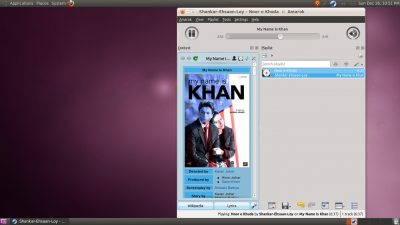
To configure the proxy for Amarok on GNOME, modify and add this to ~/.kde/share/config/kioslaverc
[Proxy Settings][$i]
ProxyType=1
httpProxy=http://username:password@proxyserver:port/
httpsProxy=http://username:password@proxyserver:port/
ftpProxy=http://username:password@proxyserver:port/
Enlightenment
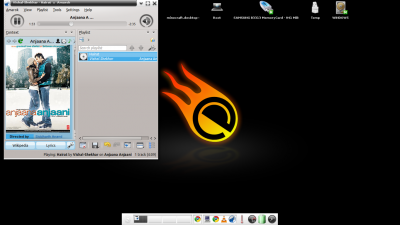
The Amarok systray icon does not work by default with E17. So, one should disable the from in Amarok's preferences.
XFCE
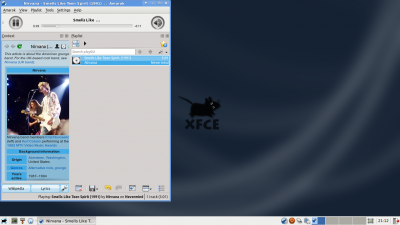
To launch Amarok faster, enable by going into and checking the option.
Fluxbox
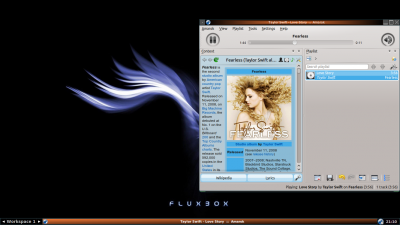
If Amarok is taking to long to load, add
exec kdeinit
to ~/.fluxbox/startup.
LXDE
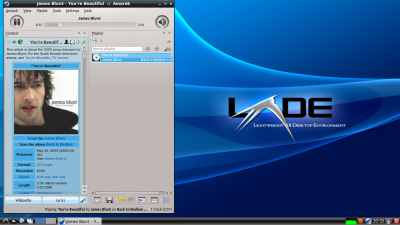
In case Amarok starts slowly in LXDE, you can add to the startup applications using the command.
